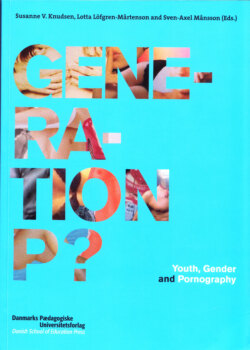Читать книгу Generation P? - Группа авторов - Страница 29
На сайте Литреса книга снята с продажи.
Liberation or intervention?
ОглавлениеLet us look at the critique of a specific text in Rosa Prosa so as to illustrate the polarisation between the repressive versus the liberating about which the critics are concerned. This particular text is titled “Pulevenner”, which is the Norwegian term for fuck-buddies or fuck-friends.12 In the form of a dialogue, two young female journalists, Åse Brandvold and Maria Børja, discuss whether the term fuck-buddy has implications not covered by either being in a couple where one ought to have sex or being friends with whom one rather ought not to have sex. In her review, Susanne Christensen writes that the discussion about the concept of fuck-friends in Rosa Prosa creates “a new sexual ethic” and that it is the most moralistic text in the book. First, this argument disregards the fact that the text is written in a markedly humorous, self-reflective mode. Second, the text is interesting in that it incorporates the last few decades’ increased sexual liberalization with regard to intimate and sexual relations and friendships. This challenges welfare politics and legal politics, which despite these changes, still privileges the long-term hetero-relational family as the normative ideal. Our culture lacks language, concepts and expressions for new practices and representations concerning intimacy and sexuality. The ‘fuck-buddy’ text plays with a new concept for an increasingly existing practice which ties friendship and sexuality together and breaks the tradidional linkage of the sexual relationship to the romantic discourse. Such a politicized conversation on ethics, responsibility and freedom, that the two young authors carry out, risks touching the normative.
‘The romanticism of liberation’ that apparently characterises Rosa Prosa is a common concern for the critics. As I pointed out above, Christensen calls upon Foucault and refers to the ‘overrepresentation’ of sexuality in the neo-liberalistic market logic. In Foucault’s analyses of ‘the aesthetics of existence’, he encourages the reader to ‘invent’ forms of subjectivity that are capable of resisting the normalization of the existing order (Foucault 1986 [1984]). The main thing, however, is that these forms of subjectivity are not to be regarded as ethical concepts for ‘the good life’ or as discourses for individual liberation. Rather, they are about interventions in normalizing discourses which in the case of Rosa Prosa are articulating new gaps between existing discourses and practices. In other words, we are not talking about the major promise of freedom, but about displacements that exist somewhere in between the productive and the oppressive, connected to complex discourses of power. The question is, then, whether ‘new’ forms of subjectivity or suggestions for sexual practices and relationship styles, such as those we find in Rosa Prosa, confirm or dislocate normative discourses. Against this background, it is meaningful to consider the textual interventions of Rosa Prosa in light of queer feminist ambitions which do, in particular, frame as a problem the normativity of gender and desire.
Here we could object that queer feminist strategies are possibly taking for granted that destabilisation of normative mechanisms automatically implies an attack on dominant power relations. As McRobbie emphasises in her discussion on sexualized postfeminist representations in Great Britain, and as the critics of Rosa Prosa also claim, this is exactly where the problem lies (McRobbie 2004). Destabilisation of some conventional practices of gender and sexuality which the authors of Rosa Prosa propose, is after all, taking place in a time when neo-liberal restructurings are actually accentuating individualization, diversity and ‘freedom of choice’. In this manner, it might be argued that this neo-liberalistic embrace of interventions with queering potentials implies processes of de-politization, a point Lois McNay makes in her book Gender and Agency (McNay 2000). These neo-liberal restructurings not only integrate, in part, the perspectives of queer feminism, and in this case new feminism, but may also constitute some of the conditions for the fact that they exist in the first place. The paradox remains, however, that tendencies of individualization which promote diversity support neo-liberal logic and serve commercial interests, but can also imply increased freedom both on an individual and a group basis (Engel 2002).
